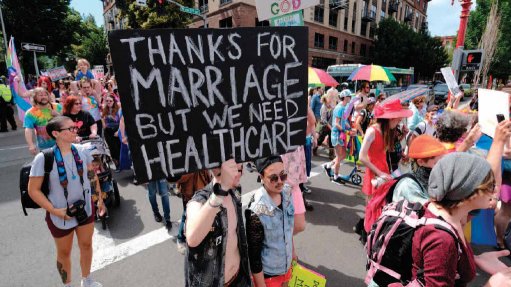
A substantial body of research indicates that lesbian, gay, bisexual, and transgender (LGBT) populations across the United States encounter significant barriers to health care. Many LGBT people have difficulty finding providers who are knowledgeable about their needs, encounter discrimination from insurers or providers, or delay or forego care because of concerns about how they will be treated. In the absence of federal legislation prohibiting healthcare discrimination based on sexual orientation and gender identity, LGBT people are often left with little recourse when discrimination occurs.
In May 2017, the US Department of Health and Human Services (HHS) signaled it would roll back regulations that prohibit discrimination against transgender people in federally funded healthcare programs. In April 2018, HHS submitted a draft of a proposed rule to this effect to the White House. At the same time, HHS has recently proposed regulations that would give providers wide latitude to discriminate or refuse to provide certain key services to LGBT people, women, and others by asserting a moral or religious objection. HHS has also created a new division within HHS’s Office of Civil Rights to address claims brought by healthcare workers who raise objections to providing medical care to certain patients based on the provider’s religious beliefs. Together, these developments threaten to exacerbate the barriers to care that LGBT people already encounter, and give insurers and providers who would deny services to LGBT people, women, and others a license to discriminate against them.
This report documents some of the barriers that LGBT people face in obtaining health care, and the toll that sweeping moral or religious exemptions can take on the health and well-being of those who are turned away by providers. It illustrates the scarcity of competent healthcare services for LGBT people in many states, the discrimination that LGBT people too often experience from providers, and the ways that negative experiences can deter LGBT people from seeking and obtaining the care they need.
The rollback of federal healthcare antidiscrimination protections and the expansion of religious exemptions for healthcare providers are each likely to impede LGBT people from obtaining healthcare services. Taken together, these moves will be devastating for many LGBT people, women, and others. Lawmakers at the federal, state, and local levels should enact laws and regulations that expressly prohibit discrimination based on sexual orientation and gender identity in health care, and should repeal or revise sweeping religious exemption laws that allow insurers and providers to deny healthcare services to LGBT people and women seeking reproductive care.
Report by Human Rights Watch